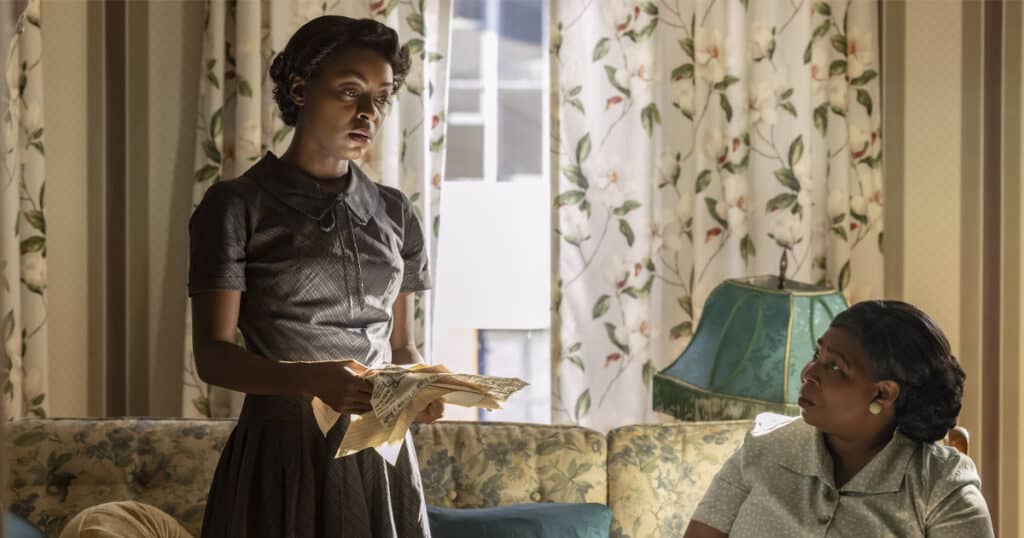PLOT: The true story of Mamie Till (Danielle Deadwyler), who became a tireless advocate for justice after the racially-motivated, brutal murder of her 14-year-old son, Emmett Till (Jalyn Hall), in Mississippi.
REVIEW: The saga of Emmett Till was likely not an easy one to translate to the big screen. After all, it’s the story of the brutal, racially motivated murder of a child by two men who never had to pay for their actions. It could have been a spectacularly tragic tale, but by shifting the focus to Till’s mother, Mamie, it becomes a powerful account of one mother’s fight for justice. Director/co-writer Chinonye Chukwu directs the film with great restraint, never shying away from the brutality of the crime, but stopping short of depicting the act itself. Rather than show Emmett’s mutilation at the hands of Roy Bryant and J. W. Milam, you hear one brutal, anguished scream of pain, and then, of course, you see Till’s infamously grotesque corpse. You can fill in the rest yourselves, so there was no need to go any further, and it’s commendable that Chukwu took this approach.
Indeed, Till is exceptionally well-crafted, with us spending a good amount of time with Emmett and his mother before the unspeakable happens. Obviously, you know how things will play out from the start, and the bittersweet moments between the boy and his mother can’t help but put a lump in your throat. The acting is terrific all-around, with Danielle Deadwyler a surefire Oscar contender for her role as Mamie Till.


Her performance is astounding, with her evoking great tenderness and love in the first half of the film, only for a switch to be flipped once she sees the body of her beloved son lie in front of hers. She knows there’s no way that he will get justice, but she will tell her story no matter what. As Mamie, Deadwyler evokes not only a mother’s love and rage but also the natural way one would bristle at how a loved one’s death could be used as a cause to rally behind. While she’s canny enough to know her son’s death could galvanize a cause, it doesn’t change the fact that he’s gone no matter what, and the palpable sense of grief never leaves her throughout the film.
It’s a great, star-making role for Deadwyler, but the rest of Till’s cast is just as effective. One of the most important roles, obviously, is Jalyn Hall as Emmett. The movie depicts him as sweet, if naive, about the reality of how things were in Mississippi at the time. The encounter between him and Haley Bennett’s Carolyn Bryant is depicted as innocent, with him impressed by her movie star good looks and letting out an ill-advised but well-intentioned whistle. Too bad for him, the (still living) Bryant was a rabid racist for whom a whistle constituted a capital crime. Bennett’s role is limited, with her only having a handful of scenes, including the original encounter and her lies on the witness stand. However, this is perhaps a wise choice by Chukwu not to focus too much on the perpetrators.
Frankie Faison (of The Wire) and Whoopi Goldberg also get juicy parts as Emmett’s guilt-plagued grandparents, with the latter having encouraged Emmett’s trip to Mississippi despite her daughter’s protests. The most gut-wrenching scene is no doubt one between Maimie and her Uncle Moses Wright (John Douglas Thompson), who was unable to protect Emmett when Bryant and Milam came for him, as his own children were in peril too. In some ways, he had to trade Emmett’s life for theirs, and Thompson plays him as guilt-ridden but resolute in the belief that he had no choice at all.
Interestingly, Till is produced by Barbara Broccoli and EON Productions, who – of course – are known for the 007 films. It’s commendable that they devoted their resources to making Till, as it tells a story that should never be forgotten. It marks one of the grimmest episodes of the struggle for civil rights, and while a deeply tragic story, the heroism of Mamie Till shouldn’t be overlooked. She took her grief and turned it into something she could use to improve the lives of everyone around her – and this is a terrific, layered tribute.